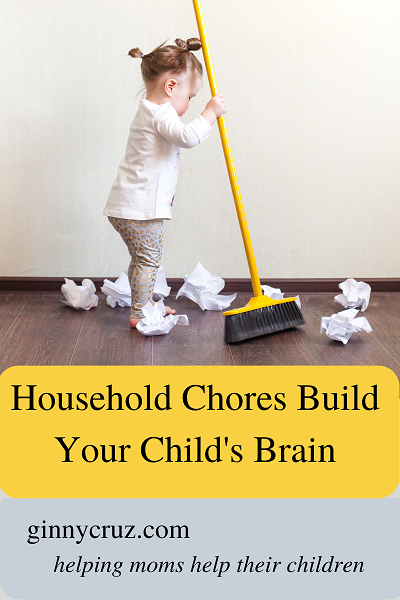Household Chores Build Your Child’s Brain
No matter what culture or socioeconomic level, every mom wants her child to be successful in life. And, we’re all guilty of thinking our generation is smarter and wiser than our parents or grandparents. Their ways are simply old fashioned, right?
In our modern world of electronic tablets, apps, and Alexa, it might surprise you to be told that one of the most overlooked and proven ways to help your child succeed in life is by having them do household chores. It sounds hard to believe, I know, that a broom, a rag, or watering can are better choices for maximum brain development in younger children than an educational program. However, it is true.
Don’t take my word for it, let’s review some research. Martin Rossmann of the University of Mississippi collected data over 25 years (beginning in 1967), to discover if asking children to perform household chores beginning at age 3 or 4 was determinative in predicting the children’s success in their mid-20s. He discovered chores developed the children’s understanding of the importance of contributing to their families and gave them a sense of empathy as adults. Those who had done chores as young children were more likely to achieve a well-adjusted life as adults. They had better relationships with friends and family and were more successful in their careers.
When neurologist Frank R. Wilson asked high achievers, many credited their success to what they learned through hands-on activities (chores) as children. He found resourcefulness and self-definition arose more from children using their bodies to do things, such as chores, than from the educational system. Characteristics such as initiative, working toward a goal, perseverance, resilience, cooperation, and self-discipline are all mastered by doing chores.
Early childhood is a time of explosive brain growth and experts know that hands-on learning develops the most brainpower. Big motor tasks such as sweeping, dusting, vacuuming, picking up toys, or carrying in groceries develop balance, strength, and a sense of accomplishment. Fine motor tasks such as setting the table, tearing lettuce leaves, folding towels, or picking up those Lego blocks build muscle control and coordination and promote the development of persistence and self-control.
Speech and language skills and reading develop best when your child’s brain is strong in the skills of self-control and your child has a balanced sensorimotor system. Many household chores will assist in the development of sensory regulations and the discipline to finish a task, especially when one would prefer to do something else.
Yes, I know doing those chores yourself is easier than helping a young child do them. However, here’s some helpful guidance on what chores can be done (it won’t be perfect, mind you) by what age child.
Eighteen Month Old’s can:
- feed a pet
- help in the garden
- help sweep or dust
- help folding towels or washcloths
- put away toys
- toss trash in the can
Two Year Old’s can:
- dress and undress themselves
- carry dishes to the sink or dishwasher
- help set the table
Three Year Old’s can:
- help weed the flowerbed
- straighten up books on a shelf
- match up socks or plastic containers and lids
- put clothes in drawers
These are a few examples to get you started. While your little one will need help and patience, know that these life skills are essential in helping your child build the brainpower to figure out how to do things and how to make oneself do them even when frustrated or weary. That’s how the essential character trait of persistence is nurtured.
If you have older children, they can help the younger ones. Mothers learn, some the hard way, to delegate and get help in running the home. It’s an all hands on deck operation.
Please rethink doing it all yourself. Children need to learn how to do real-world skills, especially the mundane ones. Relax and realize doing chores is actually good for them.
(Photo from Adobe Stock)

